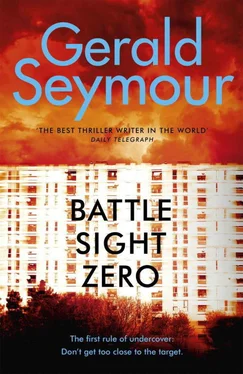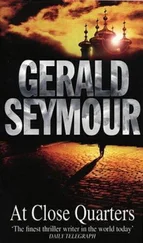‘You’ll be all right?’
‘I’ll be fine.’
‘It matters to me, you being fine.’
‘Look after yourself.’
‘I will, and don’t work all night.’
‘Won’t – we’ll speak later.’
‘Will do – love, Zed, love.’
The call went dead on her. The four-letter word. He had used it. Hadn’t before, as if he were too shy of it, or maybe had felt her beyond his reach – race, intellect, education, She hadn’t spoken the word, love , not to Andy Knight, not to any boy at the university, certainly not to anybody in the Savile Town area. He’d meant it, the call had dripped sincerity. She did not regard it as a complication, more a register of her success in recruiting his emotions: they gave her a car ride out of Marseille with a secreted package and a run through Customs on the way home, and she might have gone for a blouse rather than a T-shirt and left some buttons undone, and the pendant would be on show and nestling in the cleft, and she might have a hand on his shoulder, and the relationship would be on display, open to all-comers to see it and there would be a lift of eyebrows and they’d be waved into a green channel. How far would she go with him…? She was walking briskly. Didn’t know, could not say. She thought him so easy to deceive, she could almost pity him. Almost… She had come to Dewsbury to see her parents. Not necessary to see them, not inside the routine she kept, but because she was going away. Would be with him, close to him, perhaps needing to feed off his ignorance and take strength from him – would sleep with him? Might, might just… well, expected to.
What could go wrong? Anything could go wrong. Foreign country, foreign crime group, foreign deceit, foreign police. Could happen, arrested, handcuffs and face down on a pavement, could happen. Or a shout, or running, or a lump hammer blow on her back and the pavement rushing up and weakness spilling, and never heard the sound of the shot. Not that it would but… it could. Had been to see her parents. How was it at the university? How was her work? How were her marks? How were her job prospects? Talk, of course, of marriages arranged by parents in their wisdom; nice, dutiful girls married to Pakistani boys in that country of donkey shit and smells and poverty, and a life shut away behind a screen. All that was usual, and she had done her time with them, and had hurried away. She would meet the guys later and they would drive her from the station in Manchester to her Hall of Residence, and alone in her room she would pack. Clean clothes, wash bag, a nightdress – what a bride might have bought for a wedding night.
She could not have said why she had agreed to buy it, his money and his insistence, did not own anything else like it, but felt the slight weight of the pendant on her skin as she marched fiercely along the pavement and towards the main road that led to the bridge and then the train station. She had nothing else like that, had never been given a present of that sort from outside her immediate family. Her confusions seemed to tug tighter. Traffic passed her and her back would have been lit, and she would have seemed the dutiful and obedient daughter of her mother and father… If she were taken, handcuffed, and led out through a front door smashed by a ram, her parents would be left to a life of confusion and disgrace. Neighbours would gather and gossip. Her mother would weep and her father curse, and the street would arrive at the front door, what remained of it, to console. It did not matter to her… what was important, signally so, was the cheerfulness and the smiles and the laughter, and the determination, of the cousins who had left to fight – as she would, in her way. She crossed the bridge. The super stores were still open, and she turned past the bus station. Then she would walk up the hill, to the station, then take the train to her university city, but after she had been in the lavatories to change her clothing.
Confused, but not frightened. There was no essay to finish. When she was back she would pack her bag, and the new silky nightdress bought on impulse.
The only narcotic known to Tooth was his addiction to varied forms of criminality.
He sat on his terrace, a rug over his legs, and sipped at a fruit juice and looked across at the Ile d’If, the Count of Monte Cristo’s gaol, and the gaunt outline of battlements and defensive walls above the fabled dungeons… Fruit juice because he no longer drank alcohol: no drugs, no liquor.
Two schedules concerned him. When the Margarethe would arrive close enough to the coastline east of Marseille, out at sea but off the Calanques park where the narrow inlets were. A fishing boat would be in place and would take delivery of a package. One at first, but a trade that would grow with success… When his friend from the north of England would fly in, when they would be together to laugh and joke and decry the passing of the ‘old days’, the ‘good old days’. He felt rippling pleasure as he lounged on an upholstered bench and the wind off the water tickled in his beard, tilted his inevitable cap… Tooth had not retired. Many dreamed of that end to a successful career, but would be disappointed. Those who no longer worked at business, at deals, at trading, however much down in the market place, were dead. They demonstrated weakness, no longer enjoyed protection. It could have been the burden of his age, now in his 72nd year, had he allowed it: he did not, and the proof was the slow limping journey of an old freighter out in the Mediterranean sea, and the imminent flight to Marseille of his friend.
He was a careful man… methodical, and with the ability to examine propositions put to him, dissect the risk area, and reject or accept. It was why he did not drink alcohol, certainly why he would never addle his mind with the hashish so readily available in the city. Careful since his youth. Tooth had been the tearaway kid, looked after by his sisters after the early death of his father and while his mother took in laundry, went out to clean, slaved to feed them. He had had no fear, no hesitation in striking back if challenged.
A bright dawn, the first sunlight, the start of a September day, had changed him. An execution before five o’clock. A use for the guillotine in the yard of the Baumettes gaol, not far from where Tooth now lived. A rapist and murderer of a former girlfriend, Hamida Djanboudi, had been taken out of his cell, had been walked across a blanket-covered path, minimising the sound of his footfall, had been taken to the machine after a final Gitane and a final half glass of brandy. But every one of the thousand plus prisoners had listened, strained to hear, had noted the dulled impact of the falling blade. Forty-two years before but decisions taken: Tooth would never go back to prison, would never have a brain too confused to weigh options, would always protect his back, move with a snake’s caution. Others would run risks, not him, and he had survived, and he smiled to himself in the frail warmth of the sunlight… There were many investigators living in good homes in the 8th district who would discreetly duck a cap to him if they passed on the pavement, because he had nurtured their retirement with bribery, had successfully corrupted. It was about trust. He thought he lived in a replica of paradise.
He trusted, strange for him, the young man he had met in the park off the Boulevard Charles Livon; trusted him because he believed in the fate, as described to him without a moment of hesitation, of anyone who broke the bounds of discipline. Tooth did not do it himself, exact punishment, but knew plenty of men who would. Trust, and he did not expect to be proven wrong.
It was done with a formality. Done without noise or drama, done with a protocol. Done with inevitability.
Читать дальше












